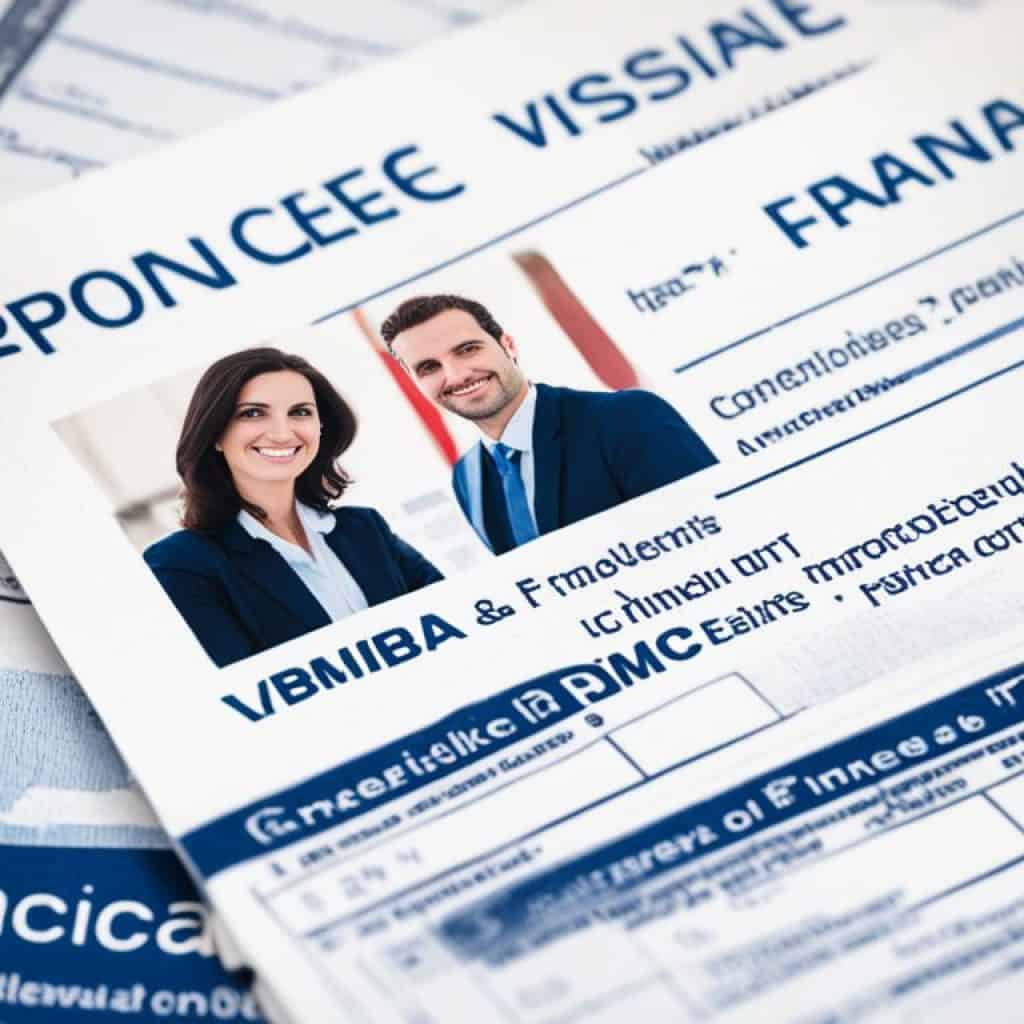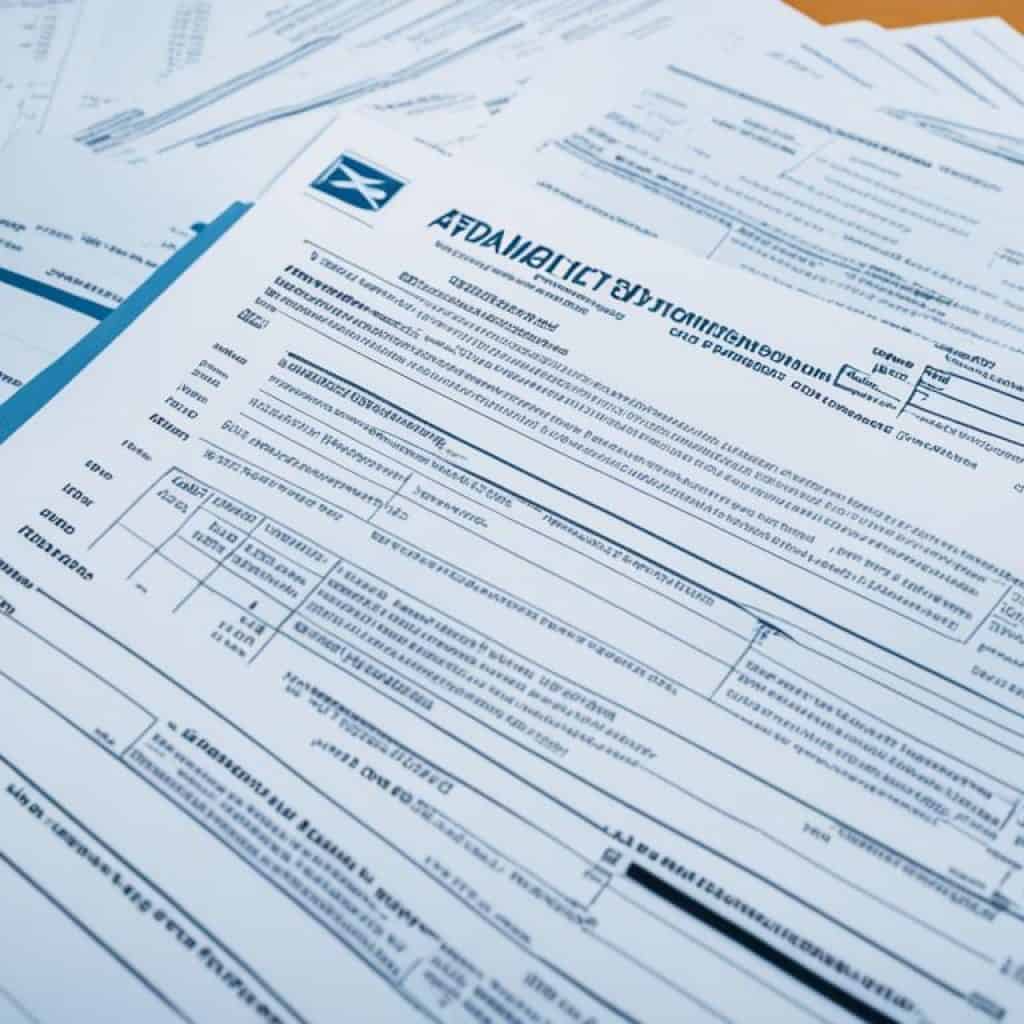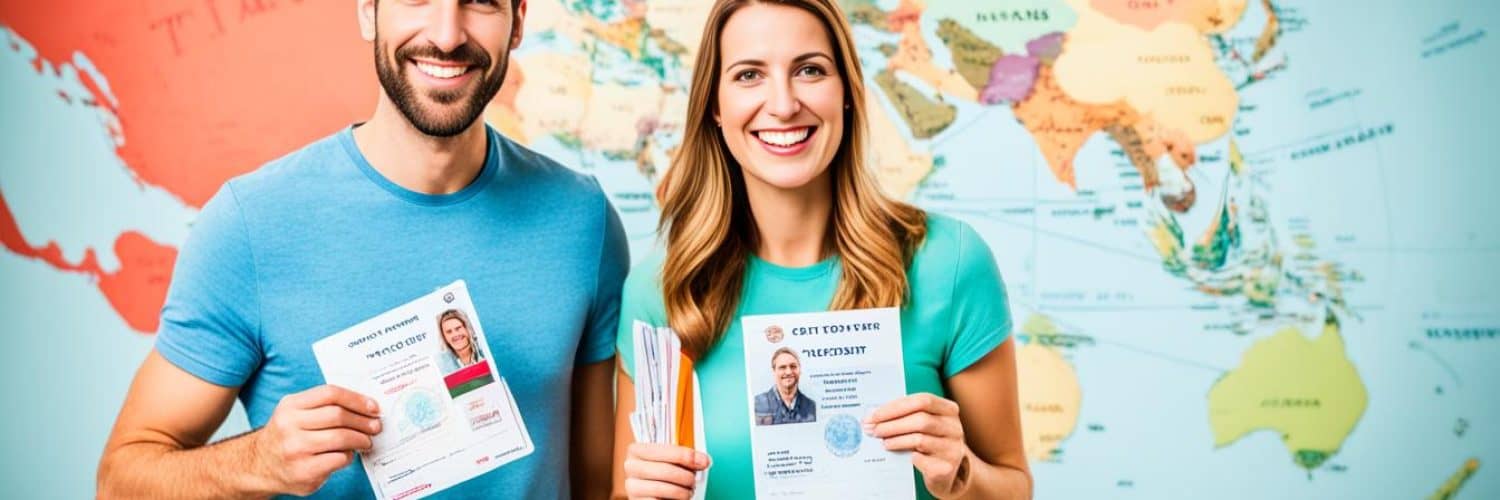Are you ready to embark on a new chapter of your life with your foreign-citizen fiance(e) in the United States? The fiance visa application process holds the key to starting your journey towards love and marriage. But do you know what it takes to navigate through the requirements, documents, and timelines? Are you prepared to tackle the interview questions and fees that come along the way?
In this comprehensive guide, we will unravel the mysteries of the fiance visa application process, providing you with the knowledge and guidance you need to successfully navigate each step. From understanding the fiance visa requirements to gathering the necessary documents, from acing the interview to overcoming potential obstacles, we will equip you with the tools for a smooth and successful application.
So, are you ready to learn more about the fiance visa process and start planning your journey towards a life together in the United States?
Key Takeaways:
- Understanding the requirements and timelines of the fiance visa application process is crucial for a successful application.
- Gathering the necessary documents and preparing for the interview are essential steps in the process.
- Each US embassy or consulate may have specific instructions and additional requirements that need to be followed.
- A medical examination and proof of financial support are important aspects of the application process.
- Being aware of your rights and protections as a foreign-citizen fiance(e) is essential before entering the United States.
Overview: What is a K-1 Visa?
A K-1 Visa is a nonimmigrant visa that allows the foreign-citizen fiance(e) of a US citizen to travel to the United States and marry their sponsor within 90 days. After marriage, the fiance(e) can apply for adjustment of status to become a permanent resident. To be eligible for a K-1 Visa, the couple must meet certain requirements, including having a qualifying relationship and meeting in person within the past two years.
“The K-1 visa allows couples to be together and start their life in the United States.”
What Is a “Fiance(e)”?
Under US immigration law, a fiance(e) is the recipient of an approved Petition for Alien Fiance(e), who has been issued a K-1 visa to travel to the United States and marry their US citizen fiance(e). Both the US citizen sponsor and the fiance(e) must have been legally free to marry at the time of filing the petition, and the marriage must be legally possible according to the laws of the state where the marriage will take place.
Being a fiance(e) allows individuals to begin their journey towards building a life together with their loved one in the United States. It provides an opportunity for couples to legally unite and create a future filled with love, support, and happiness.
Fiance(e) – A Relationship of Promise and Commitment
The role of a fiance(e) is crucial in the context of U.S. immigration law. It serves as a pathway for individuals who are engaged to a U.S. citizen and are ready to embark on their journey towards marriage and permanent residency.
The Petition for Alien Fiance(e) authorizes the issuance of a K-1 visa, which allows the non-U.S. citizen fiance(e) to enter the United States for the purpose of getting married within 90 days. This visa is a testament to the commitment and intention of the couple to build a life together in the United States.
The Eligibility Criteria
In order to be eligible for a fiance visa, certain requirements must be met. These include:
- Being legally free to marry, both for the U.S. citizen sponsor and the fiance(e) at the time of filing the petition.
- The couple must have met in person within the past two years, with some exceptions allowed in cases where meeting in person would cause extreme hardship or violate strict cultural customs.
- The intended marriage must be legally possible according to the laws of the state where the marriage will take place. In other words, the marriage must meet all legal requirements and be recognized as valid in the state where it is solemnized.
The Importance of Marriage in the Fiance Visa Process
Marriage plays a vital role in the fiance visa process. It is the ultimate goal of the visa, as the fiance(e) is expected to marry their U.S. citizen sponsor within 90 days of entry into the United States. The marriage signifies the commitment and intention to build a life together as a married couple, paving the way for further immigration processes and adjustment of status.
The marriage must be genuine and based on a true and bona fide relationship. It should not be solely for the purpose of obtaining immigration benefits. The USCIS thoroughly examines the authenticity of the relationship during the application process to ensure that the intent behind the marriage is genuine.
Throughout the process, it is important for the couple to maintain a strong and supportive relationship, as this will be assessed during interviews and may be a factor in the approval of the visa application.
The International Marriage Broker Regulation Act of 2005 (IMBRA)
The International Marriage Broker Regulation Act (IMBRA) is a crucial federal law established in 2005 to safeguard the rights of foreign-citizen fiance(e)s and regulate international marriage brokers. The primary objective of IMBRA is to prevent fraudulent or abusive relationships and ensure the well-being of individuals seeking a future with their foreign-citizen fiance(e).
Under IMBRA, petitioners filing a K-1 visa petition for their foreign-citizen fiance(e) are required to comply with specific regulations and provide essential information. This includes disclosing any past criminal convictions or restraining orders, further ensuring the safety and security of all parties involved.
By implementing IMBRA, the United States government aims to create a transparent and accountable environment for individuals embarking on an international marriage journey. This legislation sets forth measures that international marriage brokers must follow, including comprehensive background checks and disclosures, to verify the authenticity and sincerity of relationships.
“IMBRA plays a crucial role in protecting the rights of foreign-citizen fiance(e)s and preventing potential instances of fraud, abuse, or exploitation. This legislation is instrumental in fostering genuine and meaningful connections between individuals across borders.”
The IMBRA requirements not only prioritize the safety of foreign-citizen fiance(e)s but also promote trust and confidence in the overall immigration process. By adhering to IMBRA guidelines, petitioners and foreign-citizen fiance(e)s can demonstrate their commitment to building a legitimate and loving relationship.
Key provisions of the International Marriage Broker Regulation Act (IMBRA)
- Background checks on US clients: International marriage brokers are obligated to perform thorough background checks on US clients, including criminal records and restraining orders.
- Disclosure of legal rights and resources: International marriage brokers must provide foreign-citizen clients with information on their legal rights and resources available in the United States, with a particular emphasis on domestic violence, sexual assault, and child abuse protections.
- No exchange of personal contact information without consent: IMBRA prohibits international marriage brokers from sharing the personal contact information of foreign-citizen clients with US clients without explicit consent.
These provisions aim to foster transparency, promote safety, and protect the interests of foreign-citizen fiance(e)s throughout the immigration process.
Summary of IMBRA Requirements for K-1 Visa Petitioners:
| IMBRA Requirement | Explanation |
|---|---|
| Disclosure of criminal history | Provide information about any past criminal convictions or restraining orders. |
| Background check consent form | Sign a consent form allowing the International Marriage Broker to perform a background check. |
| Provision of legal rights pamphlet | Provide the foreign-citizen fiance(e) with a pamphlet outlining their legal rights and available resources. |
By adhering to the IMBRA regulations, both petitioners and foreign-citizen fiance(e)s contribute to the establishment of a secure and trustworthy environment for international relationships. This fosters mutual respect, genuine connections, and ensures the well-being of all individuals involved.

The First Step: Filing the Petition
The first step in the fiance visa application process is for the US citizen sponsor to file Form I-129F, Petition for Alien Fiance(e), with USCIS. This petition serves as the official request for the foreign-citizen fiance(e) to enter the United States and proceed with the marriage plans. To ensure a smooth and successful filing, it is crucial to understand the requirements and provide all necessary documentation.
When filing the petition, the US citizen sponsor should include supporting documentation to strengthen the case. This includes:
- Proof of US citizenship: This can be in the form of a birth certificate, passport, or naturalization certificate.
- Evidence of a qualifying relationship: This includes documents like photographs, letters, and other evidence of a genuine relationship with the fiance(e).
- Evidence of meeting in person: The couple must provide proof of meeting in person at least once within the past two years. This can be shown through travel itineraries, plane tickets, hotel reservations, or photographs together.
By compiling a strong and comprehensive petition, the chances of it being approved by USCIS increase significantly. Once the petition is submitted, it will go through a review process, and if approved, it will be forwarded to the National Visa Center (NVC) for further processing.
Submitting a complete and accurate petition is crucial, as any missing or incorrect information can lead to delays or even a denial of the petition. It’s essential to carefully review all forms and documents before submission to ensure everything is in order.
Important Considerations:
- Pay attention to USCIS filing fees and submit the necessary payment along with the petition.
- Double-check the accuracy of the provided information and ensure all required documents are included.
- Keep copies of all submitted materials for personal records.
By diligently following these steps and providing the required documentation, the US citizen sponsor can take the first step towards bringing their foreign-citizen fiance(e) to the United States.
The Second Step: Applying for a Visa
Once your petition for a K-1 Visa is approved, the next step is to apply for the actual visa so that you can travel to the United States. This process is crucial for the beneficiary (the foreign-citizen fiance(e)) and involves several important steps and documentation requirements.
Completing Form DS-160
The first step in applying for a visa is to complete Form DS-160, the online nonimmigrant visa application. This form collects essential information about the applicant, including personal details, travel history, and the purpose of the visit. It is important to provide accurate and truthful information when filling out the form.
Gathering Supporting Documentation
Along with the completed Form DS-160, you will need to submit various supporting documents to the National Visa Center (NVC) or the US embassy or consulate handling your case. These documents may include:
- A valid passport: Make sure your passport is valid for at least six months beyond your intended period of stay in the United States.
- Police clearance certificates: Some countries require applicants to provide a police clearance certificate to demonstrate their good character and absence of any criminal history.
- Medical examination report: Undergo a medical examination by a designated physician to ensure that you meet the health requirements for entry into the United States.
It is essential to gather all the required documents and ensure that they meet the specific requirements stated by the NVC or the US embassy or consulate where you will apply for the visa.
Interview with the NVC or US Embassy/Consulate
Once you have completed Form DS-160 and gathered all the necessary documentation, the NVC or the US embassy or consulate will schedule an interview for you. This interview is an opportunity for the consular officer to assess the credibility and eligibility of the applicant.
The interview will typically cover various topics, such as your relationship with the US citizen sponsor, your intentions for traveling to the United States, and your plans after arrival. It is important to be prepared and provide honest and concise answers during the interview.
Depending on the location, the wait time for an interview appointment may vary. It is advisable to check the specific processing times and requirements of the NVC or the US embassy or consulate in your country of residence.
“The visa interview is a crucial step in the application process. Be well-prepared, confident, and honest during the interview to increase your chances of a successful outcome.”
Remember that every applicant’s situation is unique, and the documentation requirements may vary. It is essential to thoroughly read and follow the instructions provided by the NVC or the US embassy or consulate to ensure a smooth visa application process.
| Documents | Description |
|---|---|
| Valid passport | A passport that is valid for at least six months beyond the intended stay in the United States. |
| Police clearance certificates | Official documents certifying the absence of a criminal record in the applicant’s home country or countries of residence. |
| Medical examination report | A comprehensive medical examination conducted by a designated physician to ensure the applicant meets the health requirements for entry into the United States. |
Having a clear understanding of the application process and providing all the necessary documents will increase your chances of a successful visa application. Stay organized, answer interview questions confidently, and follow the instructions of the NVC or the US embassy or consulate to make your application journey smoother.
Required Documentation
When attending the visa interview, the beneficiary must bring a comprehensive set of required documents to support their application. These documents are essential in establishing eligibility and providing evidence of the genuine relationship with the US citizen sponsor. It is crucial to ensure all necessary documentation is prepared and organized before the interview to avoid any delays or complications in the visa application process.
Documentation Checklist
Here is a checklist of the required documents that the beneficiary should bring to the visa interview:
| Document | Description |
|---|---|
| Completed Form DS-160 |  |
| Valid Passport | |
| Birth Certificate | |
| Divorce or Death Certificates (if applicable) | |
| Police Certificates | |
| Medical Examination Report | |
| Evidence of Financial Support | |
| Two Passport-Style Photographs | |
| Evidence of Relationship with the US Citizen Sponsor |
It is important to note that additional documents may be requested by the consular officer based on individual circumstances. Therefore, it is advisable to consult the specific embassy or consulate’s website for any additional requirements or updates.
A well-organized and complete set of required documentation is essential for a smooth and successful visa application process.
By ensuring all necessary documents are prepared and presenting them confidently during the visa interview, the beneficiary can greatly increase their chances of a favorable outcome. It is recommended to provide clear and compelling evidence of the relationship with the US citizen sponsor, such as photographs, correspondence, and any other documents that demonstrate a genuine and committed partnership.
Review Additional U.S. Embassy/Consulate-Specific Instructions
When applying for a fiance visa, it is crucial to be aware that each U.S. embassy or consulate may have specific instructions and additional requirements. These instructions are designed to ensure that the visa application process proceeds smoothly and efficiently. Failure to follow these embassy-specific instructions can result in delays or even denial of your visa application.
To ensure a successful application, carefully review the U.S. Embassy or Consulate-Specific Instructions provided on their official website. Pay close attention to any additional documents or information they require beyond the standard application requirements.
Embassy-specific instructions may vary depending on factors such as the country where the application is processed. Some embassies may require additional documentation, such as police clearance certificates or specific proof of relationship evidence. It is essential to thoroughly read and understand these instructions to avoid any unnecessary complications or delays.
Remember, missing any additional requirements specified by the U.S. embassy or consulate could significantly impact the processing time and outcome of your fiance visa application.
By carefully reviewing and adhering to the U.S. Embassy or Consulate-Specific Instructions, you can ensure that your application is complete and meets all the necessary requirements. This proactive approach will increase your chances of a successful application process and minimize any potential delays.
For detailed information on the specific embassy or consulate instructions, visit their official website or contact them directly for clarification.
Stay informed and be proactive throughout the application process to maximize your chances of obtaining a fiance visa and beginning your journey to a future together in the United States.
Common Additional Requirements
| Additional Requirements | Description |
|---|---|
| Police Clearance Certificates | Some embassies may require police clearance certificates from the beneficiary’s previous countries of residence. |
| Proof of Relationship | Embassies may request additional evidence, such as photographs, chat logs, or travel itineraries, to establish a bona fide relationship. |
| Translations | Translations of supporting documents not in English may be required. These translations should be certified by a professional translator. |
| Medical Examination | Follow any specific medical examination instructions provided by the embassy or consulate, which may include choosing an approved panel physician. |
Medical Examination and Vaccination Requirements
A medical examination is an essential part of the fiance visa application process. It is conducted by an authorized panel physician to ensure that the beneficiary meets the health requirements set by the United States government for entry into the country. While vaccinations are not mandatory for the issuance of a K-1 visa, they will be required for the adjustment of status after marriage.
During the medical examination, the panel physician will assess the beneficiary’s overall health and screening for any communicable diseases that could pose a public health risk. The examination typically includes a physical examination, review of medical history, laboratory tests, and chest x-ray for tuberculosis screening.
If the beneficiary requires vaccinations, the panel physician will administer the necessary vaccines as per the US vaccination requirements. These requirements may vary depending on factors such as age, medical history, and the beneficiary’s home country.
It is important for the beneficiary to bring any available vaccination records to the medical examination. This will help the panel physician determine which vaccinations are needed and prevent unnecessary duplication. Vaccinations that are commonly required for immigrant visa applicants include:
- Measles, mumps, rubella (MMR)
- Tetanus, diphtheria, and pertussis (TDAP)
- Varicella (chickenpox)
- Influenza
- Hepatitis B
These vaccinations are crucial not only for the beneficiary’s health but also for public health purposes. They protect both the individual and the broader community from preventable diseases.
It is important to note that the vaccination requirements may change from time to time, so it is essential to consult the latest guidelines provided by the US Department of State and the panel physician conducting the medical examination.
By completing the medical examination and fulfilling the vaccination requirements, the beneficiary demonstrates their commitment to public health and their readiness to embark on their journey to the United States with a focus on health and well-being.
Proof of Financial Support and Affidavit of Support Forms
When applying for a fiance visa, it is important for the US citizen sponsor to provide proof of financial support for the beneficiary. This is to ensure that the sponsor has the means to financially support the beneficiary during their stay in the United States. The proof of financial support can be demonstrated through the submission of Form I-134, also known as the Affidavit of Support.
The Form I-134 serves as a legal document that shows the sponsor’s commitment to financially support the beneficiary. It includes information about the sponsor’s income, assets, and other financial resources. By completing this form, the sponsor declares that they have the necessary financial means to meet the beneficiary’s financial needs during their time in the United States.
If the couple plans to adjust their status to permanent residency after marriage, a different form is required. The US citizen sponsor will need to submit Form I-864, Affidavit of Support. This form has specific income requirements and demonstrates the sponsor’s ability to provide ongoing financial support to the beneficiary as they navigate the process of obtaining permanent residency.
It is important to note that the income requirements for Form I-864 vary depending on the household size and the sponsor’s current residence. The sponsor will need to provide evidence of their income, such as tax returns, recent pay stubs, and bank statements, to meet the income requirements.
By submitting the appropriate Affidavit of Support form, the US citizen sponsor shows their commitment to supporting the beneficiary financially throughout the fiance visa application process and, if applicable, during the adjustment of status to permanent residency. This proof of financial support is essential to ensure a successful application and to meet the requirements set by US immigration authorities.
Comparison Between Form I-134 and Form I-864
| Form | Usage | Income Requirements |
|---|---|---|
| Form I-134 | For fiance visa application | Proof of financial support during the stay in the United States |
| Form I-864 | For adjustment of status to permanent residency after marriage | Specific income requirements to ensure ongoing financial support |

Providing proof of financial support through the required Affidavit of Support forms is crucial for a successful fiance visa application. It demonstrates the sponsor’s commitment to supporting the beneficiary throughout their journey and helps fulfill the income requirements set by US immigration authorities.
Fees – How Much Does a K Visa Cost?
When applying for a fiance visa, it is important to be aware of the various fees associated with the process. These fees include:
- The filing fee for Form I-129F: This fee is paid to USCIS (United States Citizenship and Immigration Services) and covers the cost of processing the petition filed by the US citizen sponsor.
- The visa application processing fee for Form DS-160: This fee is paid to the Department of State and covers the cost of processing the visa application.
- The medical examination fee: The beneficiary is required to undergo a medical examination by an authorized panel physician to ensure they meet the health requirements for entry into the United States.
- Other costs: In addition to the above fees, there may be other costs involved in the fiance visa application process, such as passport fees, translation fees (if documents need to be translated), and travel expenses for attending the visa interview.
The specific amount of these fees may vary depending on the country and the specific embassy or consulate where the application is processed. It is important to refer to the USCIS and Department of State websites for the most up-to-date fee information.
Fee Comparison – Filing Fee for Form I-129F
The following table provides a comparison of the filing fees for Form I-129F in different countries:
| Country | Filing Fee |
|---|---|
| United States | $535 |
| United Kingdom | $535 |
| Australia | $535 |
| Canada | $535 |
Please note that the fees listed in the table are for illustrative purposes only and may not reflect the current fees. It is important to check the official USCIS website for the most accurate and up-to-date information.
It is crucial to budget for these fees and factor them into your overall fiance visa application process. Being aware of the costs involved will help you plan and prepare financially for a successful application.
Rights and Protections – Pamphlet
Before the visa interview, the beneficiary should read the Rights and Protections pamphlet, which provides information about the rights and protections available in the United States relating to domestic violence, sexual assault, and child abuse. It is important to be aware of these rights and protections and seek help if needed.
“Knowing your rights is the first step towards protection and empowerment.”
The Rights and Protections pamphlet is a comprehensive resource that aims to educate and support individuals facing situations of domestic violence, sexual assault, and child abuse. It outlines the various legal rights and avenues for seeking protection, including information on obtaining restraining orders, reporting crimes, accessing support services, and understanding the legal processes involved.
***
“Your safety and well-being matter. If you are experiencing domestic violence, sexual assault, or child abuse, remember that help is available. You are not alone, and there are resources in place to support you throughout your journey.”
***
The Rights and Protections pamphlet covers essential topics, including:
- Defining domestic violence, sexual assault, and child abuse
- Understanding the signs of abuse
- How and where to report incidents
- Obtaining protection orders
- Seeking medical care and counseling
- Accessing emergency shelter
- Legal rights and options
- Navigating the criminal justice system
- Resources for support and assistance
By familiarizing themselves with the Rights and Protections pamphlet, beneficiaries can equip themselves with the knowledge and tools needed to address any potential challenges or risks they may face while residing in the United States. It is crucial to remember that these rights and protections apply to everyone, regardless of their immigration status or nationality.
Empowering Individuals – Key Takeaways from the Rights and Protections Pamphlet
| 1. Recognizing Abuse | 2. Reporting Incidents | 3. Obtaining Protection Orders |
|---|---|---|
| Learn to identify signs of domestic violence, sexual assault, and child abuse to ensure your safety and that of your loved ones. | Know how and where to report incidents to local law enforcement and seek medical care if necessary. Reporting empowers authorities to take appropriate action. | Find information on obtaining protection orders, which can provide a legal barrier against abusers and enhance your personal safety. |
| 4. Seeking Support Services | 5. Understanding Legal Options | 6. Navigating the Legal Process |
| Access a network of support services, including counseling, emergency shelter, and hotlines, that offer guidance and assistance during difficult times. | Gain insight into the legal rights and options available to survivors of domestic violence, sexual assault, and child abuse within the United States. | Understand the steps involved when engaging with the criminal justice system, such as seeking legal representation and providing testimony. |
To download a copy of the Rights and Protections pamphlet, please visit the official website of the United States Citizenship and Immigration Services (USCIS) or contact your local social service agencies, immigration support organizations, or legal aid clinics for assistance.
Conclusion
The fiance visa application process can be complex and overwhelming, but it is crucial to understand the requirements, documentation, and timelines involved. By following the necessary steps and providing all required documentation, couples can embark on their journey to building a life together in the United States.
From filing the initial petition to completing the visa application and attending the interview, each stage requires careful attention to detail. It is essential to gather all the necessary documents, such as proof of US citizenship, evidence of a qualifying relationship, and meeting in person within the past two years.
While the process can be challenging, it is important to stay focused and organized, ensuring that all requirements are met. By doing so, couples can increase their chances of a successful fiance visa application and look forward to a future together in the United States.
FAQ
What is a fiance visa application?
A fiance visa application is a process that allows a foreign-citizen fiance(e) of a US citizen to travel to the United States and marry their sponsor within 90 days of arrival.
What are the requirements for a fiance visa?
The requirements for a fiance visa include having a qualifying relationship with a US citizen, meeting in person within the past two years, and being legally free to marry at the time of filing the petition.
What is a K-1 visa?
A K-1 visa is a nonimmigrant visa that allows the foreign-citizen fiance(e) of a US citizen to travel to the United States and marry their sponsor within 90 days.
How does the fiance visa process work?
The fiance visa process involves filing a petition, applying for the visa, and ultimately applying for permanent residence. It includes steps such as completing forms, submitting supporting documentation, and attending a visa interview.
What documents are needed for a fiance visa application?
Required documents for a fiance visa application include a completed visa application form, a valid passport, birth certificate, divorce or death certificates from previous marriages, police certificates, a medical examination report, evidence of financial support, photographs, and evidence of the relationship with the US citizen sponsor.
How long does the fiance visa process take?
The fiance visa process timeline can vary, but it generally takes several months from the time of filing the petition to the issuance of the visa. Factors that can impact the timeline include USCIS processing times, availability of visa interview appointments, and the completeness of the application.
How much does a fiance visa application cost?
The fees for a fiance visa application can include the filing fee for the petition, visa application processing fee, medical examination fee, and other associated costs such as passport fees, translation fees, and travel expenses. The fees may vary depending on the country and the specific embassy or consulate where the application is processed.
What questions are asked during a fiance visa interview?
The questions asked during a fiance visa interview can vary, but they typically focus on the relationship between the petitioner and the beneficiary, plans for marriage, and the bona fides of the relationship. The consular officer may also ask questions to verify the information provided in the application and supporting documents.
How can I increase the chances of my fiance visa being approved?
To increase the chances of a fiance visa being approved, it is important to provide complete and accurate information, submit all required documentation, attend the visa interview well-prepared, and demonstrate the bona fides of the relationship with the US citizen sponsor.
What happens after the fiance visa is approved?
After the fiance visa is approved, the beneficiary can travel to the United States within the validity period of the visa, usually six months. Within 90 days of entry, the couple must get married and the foreign-citizen spouse can then apply for adjustment of status to become a permanent resident.








Add comment